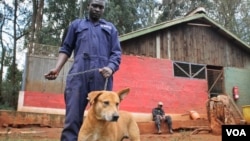The World Health Organization and World Organization for Animal Health are launching a global campaign to eliminate rabies by 2030. The two agencies say tens of thousands of lives can be saved every year by eliminating this vaccine-preventable disease.
People love their dogs. And in most cases, dogs provide loving companionship for people throughout the world. Unfortunately, dogs are the main carriers of rabies, a disease that kills more than 70,000 people worldwide each year, most of them children.
The World Health Organization says about 80 percent of people exposed to rabies live in poor, rural areas of Africa and Asia with no access to prompt treatment should they be bitten.
Rabies is the world’s deadliest disease, killing 99 percent of its victims. WHO Director-General Margaret Chan calls this an irretrievable and unnecessary loss as rabies can be prevented by vaccinating dogs against this disease.
“Vaccinating at least 70 percent of the dog population breaks the cycle of transmission in ... dogs. When canine rabies goes down, so do human rabies deaths. Mass vaccination is by far more effective and also more humane … than rounding up stray dogs and destroying them,” said Chan.
Mass vaccination campaigns also are more cost-effective. WHO estimates a dog vaccine costs less than one dollar, whereas the cost of treating people who are bitten is between $40 and $50. This represents, on average, 40 days of wages in some affected countries in Africa and Asia.
Bernard Vallat, director general of the World Organization for Animal Health, says besides endangering the lives of humans, rabid dogs also pose a threat for endangered wildlife. He tells VOA rabid dogs in Africa often penetrate protected animal reserves and infect buffalo, antelopes, wild dogs and other vulnerable wildlife.
“So controlling rabies in dogs will lead also to save some endangered species, particularly in Africa is a good argument also to be developed for promoting dog vaccination,” said Vallat.
Health experts agree a comprehensive and coordinated national approach is needed to run a successful mass dog vaccination campaign. For best results, they say governments must involve veterinarians in the private sector and local communities who know the people who own the dogs that could become rabid if neglected and not vaccinated.







